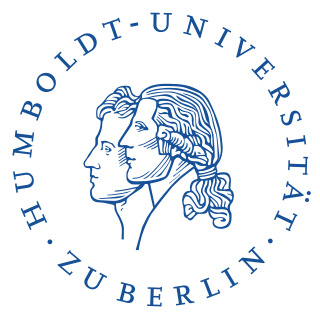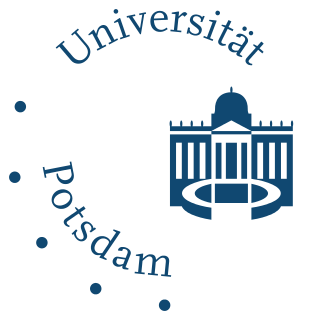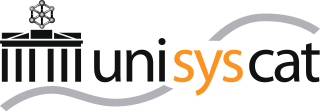
The Humboldt University of Berlin is a public research university in the central borough of Mitte in Berlin, Germany. It has been conferred the title of "University of Excellence" under the German Universities Excellence Initiative.

The Free University of Berlin is a public research university in Berlin. It is one of Germany's most prestigious universities, with a particular emphasis on the humanities and political science.

The Max Planck Society for the Advancement of Science is a formally independent non-governmental and non-profit association of German research institutes. Founded in 1911 as the Kaiser Wilhelm Society, it was renamed to the Max Planck Society in 1948 in honor of its former president, theoretical physicist Max Planck. The society is funded by the federal and state governments of Germany.
TU Dresden (for German: Technische Universität Dresden, abbreviated as TUD and often called the Dresden University of Technology is a public research university in Dresden, Germany. It is the largest institute of higher education in the city of Dresden, the largest university in Saxony and one of the 10 largest universities in Germany with 32,389 students as of 2018.

The Gottfried Wilhelm Leibniz Prize, or Leibniz Prize, is awarded by the German Research Foundation to "exceptional scientists and academics for their outstanding achievements in the field of research". Since 1986, up to ten prizes have been awarded annually to individuals or research groups working at a research institution in Germany or at a German research institution abroad. It is considered the most important research award in Germany.

The University of Potsdam is a public university in Potsdam, capital of the state of Brandenburg, Germany. It is mainly situated across three campuses in the city. Some faculty buildings are part of the New Palace of Sanssouci which is known for its UNESCO World Heritage status.

The Berlin-Brandenburg capital region is one of the most prolific centers of higher education and research in the world. It is the largest concentration of universities and colleges in Germany. The city has four public research universities and 27 private, professional and technical colleges (Hochschulen), offering a wide range of disciplines. Access to the German university system is tuition free.

Dahlem is a locality of the Steglitz-Zehlendorf borough in southwestern Berlin. Until Berlin's 2001 administrative reform it was a part of the former borough of Zehlendorf. It is located between the mansion settlements of Grunewald and Lichterfelde West.

The Fritz Haber Institute of the Max Planck Society (FHI) is a science research institute located at the heart of the academic district of Dahlem, in Berlin, Germany.

Gerhard Ertl is a German physicist and a Professor emeritus at the Department of Physical Chemistry, Fritz-Haber-Institut der Max-Planck-Gesellschaft in Berlin, Germany. Ertl's research laid the foundation of modern surface chemistry, which has helped explain how fuel cells produce energy without pollution, how catalytic converters clean up car exhausts and even why iron rusts, the Royal Swedish Academy of Sciences said.
Manfred Baerns was a German chemist.
The Karl-Scheel-Preis is an award given annually by the Physikalische Gesellschaft zu Berlin, a regional association of the Deutsche Physikalische Gesellschaft, for outstanding scientific work. The prize was established through an endowment by the German physicist Karl Scheel and his wife Melida. Recipients are awarded with the Karl-Scheel Medal and 5.000 Euros. The Karl-Scheel Medal in bronze was designed by the German sculptor Richard Scheibe and has a diameter of 12 cm.
Frank Glorius is a German chemist and W3-Professor of organic chemistry in the Department of Chemistry and Pharmacy at the Westfälische Wilhelms-Universität in Münster.
Beatriz Roldán Cuenya is a Spanish physicist working in surface science and catalysis. Since 2017 she has been director of the Department of Interface Science at the Fritz Haber Institute of the Max Planck Society in Berlin, Germany.
Robert Schlögl is a German chemist known for research in catalysis. Currently, he is the Director and Scientific Member of the Fritz Haber Institute of the Max Planck Society in Berlin and the Max Planck Institute for Chemical Energy Conversion in Mülheim an der Ruhr. He became president of the Alexander von Humboldt Foundation in 2023.
Karsten Reuter is a German physicist and chemist.

Matthias Scheffler is a German theoretical physicist whose research focuses on condensed matter theory, materials science, and artificial intelligence. He is particularly known for his contributions to density-functional theory and many-electron quantum mechanics and for his development of multiscale approaches. In the latter, he combines electronic-structure theory with thermodynamics and statistical mechanics, and also employs numerical methods from engineering. As summarized by his appeal "Get Real!" he introduced environmental factors into ab initio calculations. In recent years, he has increasingly focused on data-centric scientific concepts and methods and on the goal that materials-science data must become "Findable and Artificial Intelligence Ready".
Peter Strasser is a German chemist. He is the winner of the 2021 Faraday Medal.

The Cluster of Excellence Unifying Systems in Catalysis (UniSysCat) is an interdisciplinary research network funded by the German Research Foundation (DFG) as a part of the federal and state excellence strategy of Germany, Exzellenzstrategie. The funding period runs from January 1, 2019 to December 31, 2025. Around 300 researchers from the Berlin and Potsdam area work in UniSysCat, focusing on current issues in catalysis research. UniSysCat is the follow-up project of the Cluster of Excellence Unifying Concepts in Catalysis (UniCat), which was funded from 2007 to 2018 as part of the federal and state excellence initiative of Germany Exzellenzinitiative.
Arne Thomas is a German chemist who researches porous and nanostructured materials for catalytic applications.
This page is based on this
Wikipedia article Text is available under the
CC BY-SA 4.0 license; additional terms may apply.
Images, videos and audio are available under their respective licenses.










